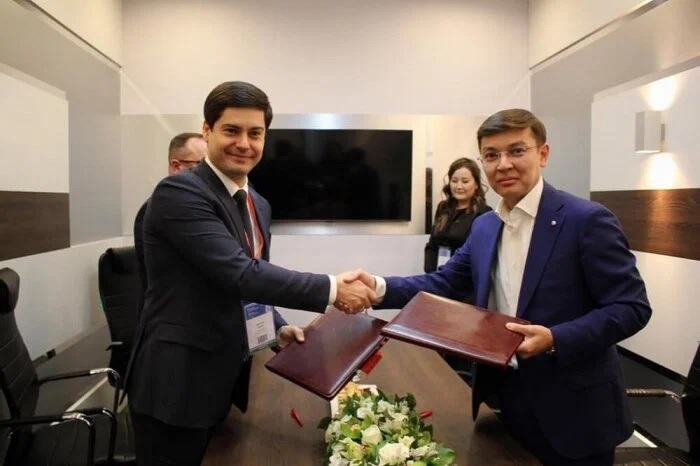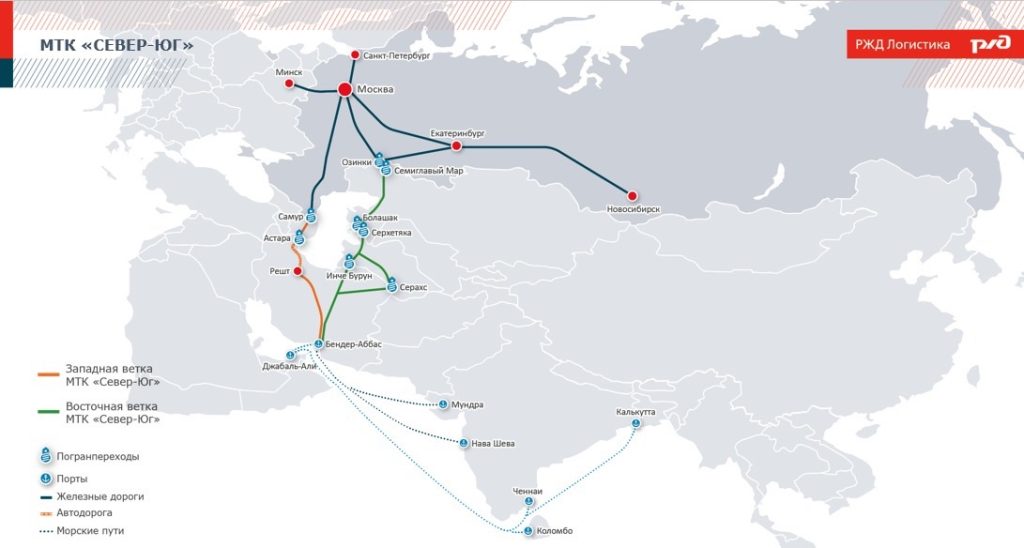Last week, a number of countries connected by the International North-South Transport Corridor (INSTC) – the main transport artery between Russia, Central, South and Southeast Asia – have taken a number of further steps to simplify logistics along the route, and have also voiced their initiatives to unlock the potential of the corridor as soon as possible.
Turkmenistan, Russia and Kazakhstan are creating a single logistics operator on the eastern branch of INSTC
Within the framework of the 27th International exhibition of transport and logistics services “TransRussia 2023”, KTZ Express (Kazakhstan), Russian Railways Logistics (Russia) and JSC ‘Transport and Logistics Center of Turkmenistan’ inked a memorandum on the establishment of a joint venture for the development of transportation along the North-South corridor, Kazakh Railways “KTZ” reported.
The JV will aim at setting up a single logistics operator on the eastern route of the INSTC.
The parties agreed to join their competencies to form competitive tariff rates and “seamless” transportation of goods from Kazakhstan, Russia, Turkmenistan to Iran, India, the Middle East and the Asia-Pacific region with the participation of border crossings Aksaray, Ozinki, Bolashak, Inche-Burun, Serakhs and in reverse.
The North-South corridor for Kazakhstan is one of the main points of growth in the development of transport and economic ties with Iran and India. According to Kazakhstani shippers, the obvious advantages of this overland corridor through the territory of Kazakhstan is the high speed of freight delivery and practical all-weather transportation.
Turkmenistan is becoming an increasingly active participant in the North-South project
The transport and logistics infrastructure of Turkmenistan is becoming an increasingly active segment of the North-South corridor.
Russian Ambassador to Turkmenistan Alexander Blokhin announced Turkmenistan’s plans to officially join the agreement on INSTC.
“There is an agreement on the North-South corridor, Turkmenistan is ready to officially become a party to it. North-South is not only an important artery for the Russian Federation today in this turbulent political system, but also for Turkmenistan, because being a transit country is always very profitable, it means additional serious revenues to the state budget. And I am sure that Turkmenistan is as interested in this as the Russian Federation,” he said in an interview with TASS.
Recently, the Eurasian Economic Union included Turkmenistan in the Eurasian Agroexpress project, which provides accelerated container rail and multimodal transportation of food and agricultural products between the EAEU countries (Armenia, Belarus, Kazakhstan, Kyrgyzstan, Russia) and Southeast and Central Asia via the North-South ITC.
Agroexpress plans to organize monthly pilot shipments along the eastern branch of the North-South corridor passing through Turkmenistan, with the joining of Belarus, Kazakhstan and Kyrgyzstan.
Turkmenistan, which traditionally stands for mutually beneficial transport connectivity in the North-South and East-West directions, has outlined a number of steps to upgrade its national railway network.
At one of the government meetings, President Serdar Berdimuhamedov ordered to increase domestic, transit and international cargo freight and to work on creation of new transport and transit corridors.
To this end, the head of state instructed the government to prepare proposals for the implementation of projects for the reconstruction of internal railways, modernization of the material and technical base of the railway sector, and the study of international experience in the construction of an electrified railway network.
Iran is determined to use the potential of the North-South corridor and calls for strengthening infrastructure along all three branches of the ITC
To activate all the capacities of North-South corridor, it is required to strengthen the transport network in the Caspian Sea through establishing evermore relations with the Russian ports and other Caspian Sea littoral states, Tasnim quotes the head of Iran’s Transport Development Fund Davood Danesh Ja’fari. The remarks were made at the 27th International Exhibition of Transport and Logistics Services and Technologies “TransRussia 2023″.
According to him, Iran provides opportunities for foreign companies and the domestic private sector to participate in the development of transport infrastructure, such as the North-South Corridor.
In eastern Iran, considerable projects exist for strengthening and developing transport at North-South Corridor, he said, adding, that a part of transport requirements of the region can be met through taking advantage of the capacity of Bandar Abbas Railway to Incheh-Boroun and Turkmenistan and also Sarakhs (on the Iranian-Turkmen border).
The Ambassador of Iran to Russia Dr. Kazem Jalali, opening the discussion session “North-South: Seamless Technologies, maritime logistics and the development of multimodality” at the international expo TransRussia 2023, listed a number of infrastructure tasks that should be tackled by the participants of the North–South international transport corridor project (“Rzd-Partner”, 20 April 2023)
The results of test cargo transportation along the eastern branch of the corridor (originates in Russia, then passes through Kazakhstan, Turkmenistan and then goes through the eastern part of Iran towards the Persian Gulf) demonstrated the full readiness of this route for cargo freight. This branch also has a continuation to the north of Africa, to the countries of the Middle East, as well as to India and Pakistan, the source notes.
However, according to the Iranian ambassador, this branch still needs infrastructure enhancement of the railway section running via Iran. In particular, it is necessary to complete electrification on the 495 km–long Garmsar – Incheh-Boroun line, which is a joint project for Iran and Russia.
Another branch of the North-South corridor, which is considered as multimodal, connects the ports of Russia across the Caspian Sea with the northern ports of Iran. And onward from Iran, the cargo can be transported to the Persian Gulf, to the countries of the Middle East, Africa, as well as to Pakistan and East Asia. However, on this branch, it is still necessary to improve the infrastructure of the Caspian ports in Russia, in the north of Iran, as well as in the Caspian states, Jalali noted.
A road service has been launched on the western branch of INSTC (connects the railway network of Azerbaijan with Iran, then heads for the seaports of India). As for the railway infrastructure on this branch, 162 km-long Astara–Rasht section remains unfinished in Iran.
According to the Ambassador, Russia and Iran continue intensive negotiations on the completion of its construction and there are good signs for it to be launched in 2023.
***
The North—South International Transport Corridor is a key element of the transport framework of Eurasia. It connects with most of the latitudinal Eurasian transport corridors.
INSTC demonstrates a number of advantages over other routes, including the marine route through the Suez Canal. The delivery time of goods from Mumbai in India to St. Petersburg in Russia via the Suez Canal is 30-45 days, while along the North-South corridor, the deliveries from India to Russia via the overland INSTC route take only 15-24 days, along the eastern branch – up to 15-18 days.///nCa, 24 April 2023

